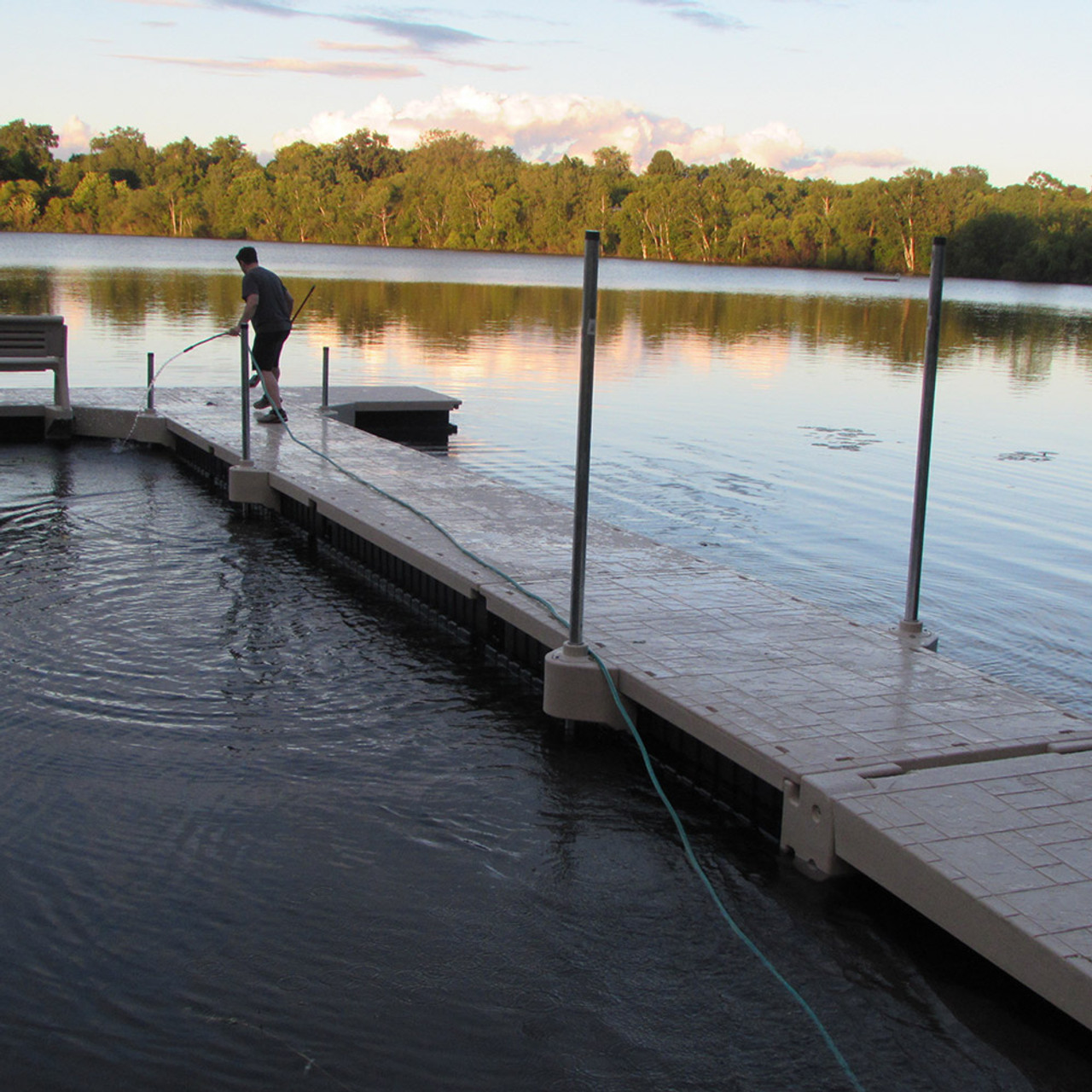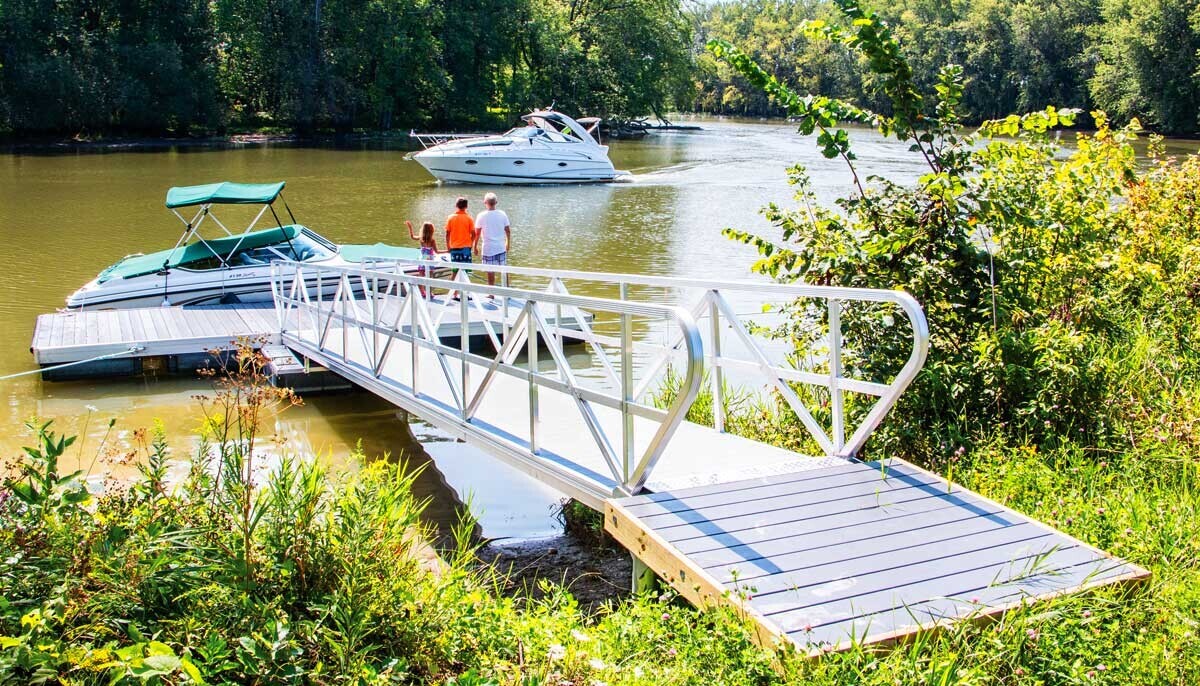Why Floating Docks Are the Perfect Solution for Your Waterside Needs
Floating docks present an engaging remedy for waterside requirements, especially due to their adaptability to fluctuating water degrees and their durable, modular style. These structures not only boost capability for both industrial and recreational purposes but additionally supply modification choices tailored to specific requirements. Their ecologically friendly materials contribute to sustainability initiatives. As we check out the multifaceted advantages and applications of floating docks, it comes to be noticeable why they stand out in the realm of waterside facilities-- especially when taking into consideration the lasting advantages they offer different stakeholders.
Secret Advantages of Floating Docks
The adaptability of floating docks offers countless advantages for waterside applications, making them an increasingly popular option among marina drivers and property developers. One of the main advantages is their flexibility to rising and fall water levels, which allows them to remain functional in various atmospheres, consisting of lakes, rivers, and coastal locations. Unlike typical set docks, floating docks can fall and increase with the trends and seasonal adjustments, ensuring consistent ease of access.
Furthermore, floating docks are commonly easier and less costly to preserve and set up. Their modular style promotes fast setting up, reducing labor costs and building time. Moreover, the products utilized in floating dock building and construction are often resistant to corrosion, guaranteeing longevity with minimal upkeep.
Safety is an additional vital benefit; the buoyant nature of these docks reduces the danger of mishaps throughout boarding and getting off, making them specifically appealing for family-oriented centers. Their ecological impact is reduced than that of set structures, as they do not disrupt aquatic environments. Collectively, these benefits position floating docks as a remarkable service for a series of waterside demands, aligning with both functional efficiency and environmental considerations.
Suitable Applications for Numerous Activities
Versatility is a hallmark of floating docks, making them suitable for a large range of activities throughout various beachfront settings. These functional structures can offer as perfect systems for recreational tasks such as boating, angling, and swimming. Their buoyant nature permits simple accessibility to boat, enabling smooth departure and disembarkation, while also supplying a stable location for anglers to cast their lines.
In industrial setups, floating docks assist in the loading and dumping of products, suiting both big and little vessels. They are specifically valuable in areas with fluctuating water degrees, guaranteeing that operations remain nonstop. Furthermore, floating docks can be made use of for waterside eating and enjoyment, providing a breathtaking and distinct experience for clients.
Environmental applications are additionally notable; floating docks can operate as monitoring platforms for wildlife enjoying or as docking stations for research study vessels taken part in eco-friendly researches. As marina developments become more prevalent, these docks offer a practical remedy for boosting capacity without extensive land modifications. Eventually, the versatility of floating docks makes them a favored selection for anyone seeking functional and reliable beachfront options.
Style and Modification Options
Floating docks not only provide to varied activities but additionally use a series of design and modification choices that enhance their capability and aesthetic appeal. These functional structures can be customized to fit certain waterside demands, whether for property, industrial, or entertainment functions.
One key facet of customization is the selection of materials. Alternatives range from high-density polyethylene to light weight aluminum, each supplying distinct advantages in terms of durability and upkeep. Additionally, the arrangement of the dock can be adapted to match different water helpful site levels and ecological conditions, making certain stability and safety.
Layout functions can consist of incorporated seating, barriers, and lights, which not just improve use yet also enhance the appearance of the dock. Personalized surfaces and colors permit owners to match the dock with existing frameworks or individual preferences, creating a cohesive search for the waterside.
Moreover, floating docks can be designed with modular sections, making it possible for easy growth or reconfiguration as demands change. This adaptability is particularly important for expanding family members or developing industrial ventures. Overall, the substantial layout and modification options available make floating docks an extremely versatile solution for any waterside setup.
Installation and Maintenance Factors To Consider
Generally, effective installation and maintenance of floating docks need cautious planning and focus to detail. Prior to beginning setup, it is essential to examine the specific site problems, including water depth, wave activity, and local policies. This preliminary evaluation notifies the selection of materials and style, making certain the dock will withstand environmental tensions.

Maintenance is just as crucial to extend the lifespan of the dock. Normal evaluations must be carried out to identify wear and tear, especially on flotation tools, adapters, and outdoor decking. Cleaning up the dock occasionally aids stop the buildup of algae and debris, which can endanger surface honesty and looks.
Furthermore, seasonal prep work, such as eliminating devices and securing the dock during extreme weather, can protect against damage. By focusing on appropriate installation and routine maintenance, proprietors can ensure their floating dock remains a functional and reputable beachfront service for several years to find.

Ecological Influence and Sustainability
The environmental impact of floating docks is an important consideration for waterfront tasks, as these frameworks engage directly with marine ecological communities. floating dock services. Unlike standard fixed docks, floating docks lessen disruption to the substratum, enabling natural debris motion and decreasing erosion. Their layout permits water flow under, promoting healthy and balanced marine environments and sustaining regional wildlife
Lots of floating docks are built from sustainable products, such as environmentally friendly composites and recycled plastics, which lower the carbon impact connected with manufacturing. Modern layouts incorporate attributes that enhance ecological sustainability, click resources such as permeable surface areas that assist in water filtration and decrease contamination.
Floating docks additionally provide an excellent platform for habitat reconstruction by supporting the growth of water plant life and offering shelter for fish and other aquatic microorganisms. By including functions like fish environments and immersed growings, floating docks can enhance biodiversity in the location.
In enhancement, these frameworks can be designed to fit photovoltaic panels, giving renewable energy choices that better reduce their environmental effect (floating dock company). On the whole, floating docks represent a lasting remedy that stabilizes human use watersides with the conservation of essential communities
Verdict
In conclusion, floating docks existing a very versatile and lasting remedy for varied waterfront needs. Their modular style, combined with using durable, corrosion-resistant materials, makes sure durability and convenience of upkeep. The flexibility of floating docks accommodates different applications, ranging from entertainment tasks to commercial operations while lessening environmental effect. Eventually, the personalized functions and ability for development further solidify floating docks as an optimal option for any beachfront job.
Floating docks present an engaging option for waterside needs, particularly due to their adaptability to fluctuating water degrees and their robust, modular layout. Unlike conventional set docks, floating docks can drop and increase with the trends and seasonal modifications, guaranteeing regular availability.
Collectively, these benefits position floating docks as an exceptional solution for websites a variety of beachfront requirements, straightening with both operational performance and environmental factors to consider.
Overall, the considerable design and modification options offered make floating docks an extremely versatile service for any kind of waterfront setup.
Unlike traditional set docks, floating docks reduce disturbance to the substrate, permitting for natural sediment activity and decreasing disintegration.